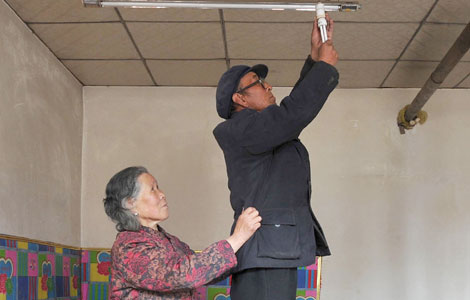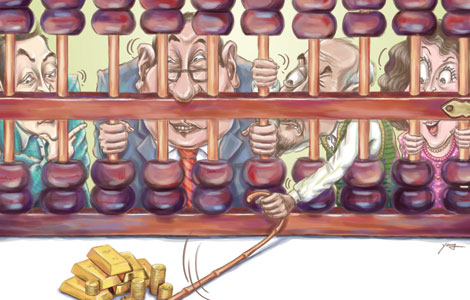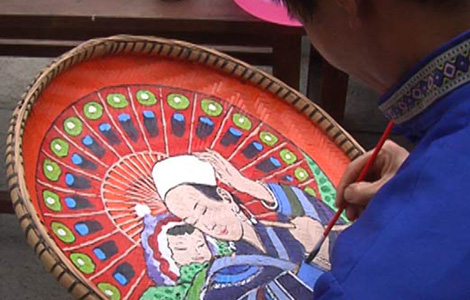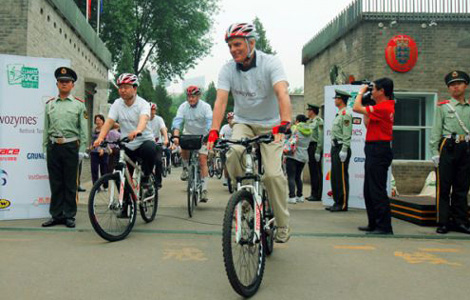Shanghai plans street performer pilot
Updated: 2013-05-25 01:30
By WU YIYAO in Shanghai (China Daily)
|
|||||||||||
Shanghai plans to launch a pilot program to regulate street performances and give performers more legal spaces to present their shows, according to the Shanghai Municipal Administration of Culture, Radio, Film and TV.
For years, street performers such as singers have been holding shows across the city, but some of them were classified by the authorities as beggars.
In future, the city will provide artists with additional spaces for performances, including streets, urban green areas and subway stations, said Hu Jinjun, head of the administration.
"Authorities in the city have been discussing ways to design benchmarks for access, set up minimum levels for street performance artists, and to try to explore whether the administrative measures clash with existing urban administration rules," Hu said.
Like many metropolises around the world, Shanghai, which has a huge population and thousands of public spaces, has become a hub for street artists. Many of them have permanent spots and loyal audiences.
"In London's Covent Garden and New York's Times Square, and in many other hot spots around big cities in the world, street performances are an essential part of urban culture. In Shanghai, I've seen many street shows and they are wonderful," said Stella McGraig, a 29-year-old teacher in Shanghai who has lived in the city for two years.
A 48-year-old street violinist who plays in the evenings around East Nanjing Road - one of Shanghai's busiest downtown areas - said under condition of anonymity that he applauds the authorities' proposed pilot program for street artists.
"Street performance artists play for a number of reasons - some play for a sense of fulfillment because they wish to expose their talents to a wider audience, some play for money because they have to support their families and want to have a better life. Some even play for free - they give shows just for fun," he said.
The planned regulations may give street artists encouragement and help to recognize them as appreciated professionals, he added.
However, some street artists are skeptical.
Zhang Xiaomen, a 62-year-old flute player at People's Square in downtown Shanghai, said he does not wish to be "regulated".
"I've been playing around here for years - every corner can be my stage; I don't really care what people think of me - whether they think I'm a beggar or a proper flute player. I'm making money from my work, and my worry is that regulators may charge us for examinations, forcing us to pass tests to get a certificate to play or things like that, which may take away a part of my already-humble income," Zhang said.
A system to manage street performances needs to be implemented, but only after some questions are answered, said Wang Junzhi, a lawyer in Shanghai.
"The questions are whether local authorities are entitled to create benchmarks for qualifications for certain professionals or not, and how to draw the line between artists who play while begging and other street performers," Wang said.
Related Stories
Work gets underway on Shanghai Disneyland 2013-05-24 21:03
Stylish Shanghai 2013-05-24 07:33
Shanghai metro campaign fights obscenity 2013-05-23 16:16
Shanghai to allow chicken again 2013-05-22 07:49
Shanghai focuses on elevator safety 2013-05-21 16:44
Shanghai hosts contemporary painting exhibition 2013-05-21 15:15
Today's Top News
Japan urged to face history
Dialogue only solution to disputes
China to enhance AU partnership
Scrutiny urged to curb graft
Gutter oil to be used as auto fuel
Shanghai warns against telecom scams
Diaoyu Islands 'have never been Japan's territory'
China closes the gap with Switzerland, Europe
Hot Topics
Lunar probe , China growth forecasts, Emission rules get tougher, China seen through 'colored lens', International board,
Editor's Picks

|

|

|

|

|

|





